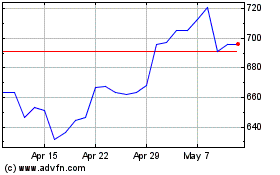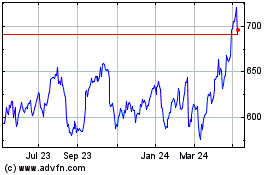By Kimberly Chin and Frances Yoon
HSBC Holdings PLC will stop serving mass-market individual
customers and smaller businesses in the U.S., exiting the bulk of a
retail business that has long struggled to compete with America's
big banks.
The bank said late Wednesday that it will sell 90 of its 148
branches in the U.S., and plans to wind down another 35 to 40. HSBC
agreed to sell parts of its business to two U.S. regional banks,
Citizens Financial Group Inc.'s Citizens Bank and Cathay General
Bancorp's Cathay Bank.
HSBC said it will retain around two dozen locations, which will
become international wealth centers providing banking and
wealth-management services to high-net-worth clients. A spokeswoman
said these centers would be in cities such as New York, Washington,
D.C., San Francisco, Seattle, Los Angeles and Miami.
It will go from about 1.4 million customers to roughly 300,000
in the U.S. It will no longer service customers with basic bank
accounts, or those with balances below $75,000, and businesses with
turnover of $5 million or less.
The shift will let HSBC focus on its competitive strengths, HSBC
Group Chief Executive Noel Quinn said, adding that the bank's U.S.
mass retail operations are good businesses but lack the scale to
compete.
The London-based lender, which makes most of its profit in Hong
Kong and mainland China, is more than a year into an overhaul to
refocus its operations in Asia. In February, the bank said that it
was considering selling its unprofitable U.S. retail operations and
pouring about $6 billion of investment into Asia in the next five
years.
HSBC is also in talks to sell its unprofitable French retail
bank.
Cindy Wang, research director for DBS Bank in Hong Kong, said
HSBC might unload more bank branches in Europe, to reinvest in Hong
Kong and mainland China. "It's a trend for the global banking
industry -- to cut offline branches and leverage mobile and digital
banking to save costs," Ms. Wang said.
The bank will sell its East Coast mass-market and
retail-business-banking operations, which include 80 branches and
around 800,000 customer accounts, as well as its online bank
portfolio to Citizens Bank. Those accounts had about $9.2 billion
in deposits and $2.2 billion in outstanding loans as of the end of
March.
Cathay Bank will buy 10 branches, with about 50,000 customer
accounts, on the West Coast.
The deals, which are subject to regulatory approval, are
expected to close in the first quarter of 2022. HSBC said it
expects the deals to incur about $100 million in pretax costs, and
foresees no material impact to its capital base, as measured by its
core-equity Tier 1 capital ratio.
HSBC established a big U.S. branch presence in the 1980s and
1990s, first by buying Marine Midland Banks Inc. and later adding
Republic New York Corp. The takeovers were part of a string of
deals that transformed the Hong Kong-focused lender into a global
banking giant.
As recently as a decade ago, HSBC had close to 500 retail
outposts in America, with a filing for 2011 disclosing 461
branches.
But HSBC has more recently retrenched. In 2012, the lender sold
its U.S. credit-card business to Capital One Financial Corp., and
sold some branches, mostly in upstate New York, to First Niagara
Financial Group Inc.
HSBC's broader U.S. wealth and personal-banking operations
generated about $1 billion of operating income last year. HSBC said
the businesses it is exiting made up about 13% of that wider
business's customer loans, and 21% of deposits, as of
end-March.
HSBC said the latest pullback wouldn't disrupt its plans to grow
in Asia, adding that many wealthier clients in the region valued
the U.S. as a destination for studying, doing business, buying
property or diversifying their investments.
"The U.S. plays a large role in HSBC's Asia growth strategy,
particularly in support of our ambitions to become the leading
wealth manager in Asia," said Greg Hingston, the bank's regional
head of wealth and personal banking.
On Thursday afternoon in Hong Kong, HSBC's locally traded stock
rose 0.3% to 49.25 Hong Kong dollars per share, equivalent to about
$6.34. As of Wednesday's close, the bank's Hong Kong-listed stock
had risen 20.5% so far this year.
Write to Kimberly Chin at kimberly.chin@wsj.com and Frances Yoon
at frances.yoon@wsj.com
(END) Dow Jones Newswires
May 27, 2021 03:01 ET (07:01 GMT)
Copyright (c) 2021 Dow Jones & Company, Inc.
Hsbc (LSE:HSBA)
Historical Stock Chart
From Jun 2024 to Jul 2024

Hsbc (LSE:HSBA)
Historical Stock Chart
From Jul 2023 to Jul 2024
